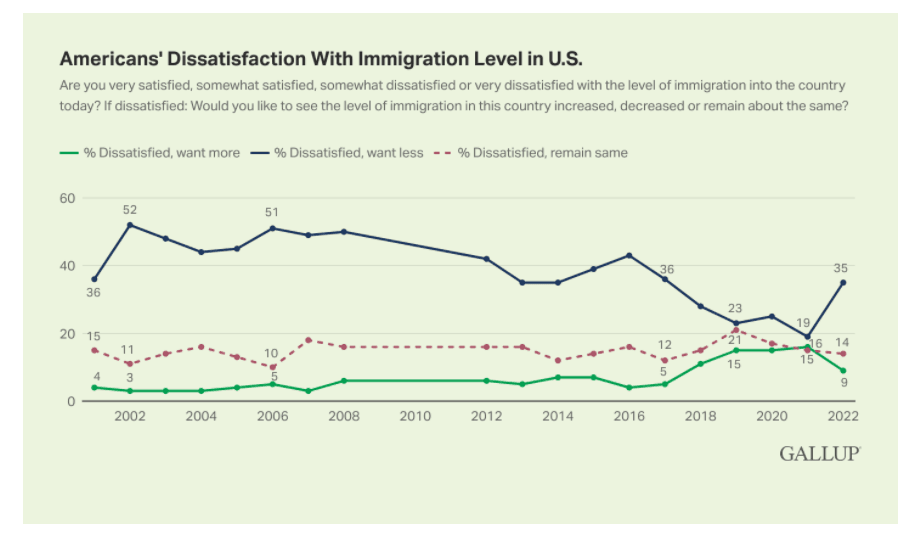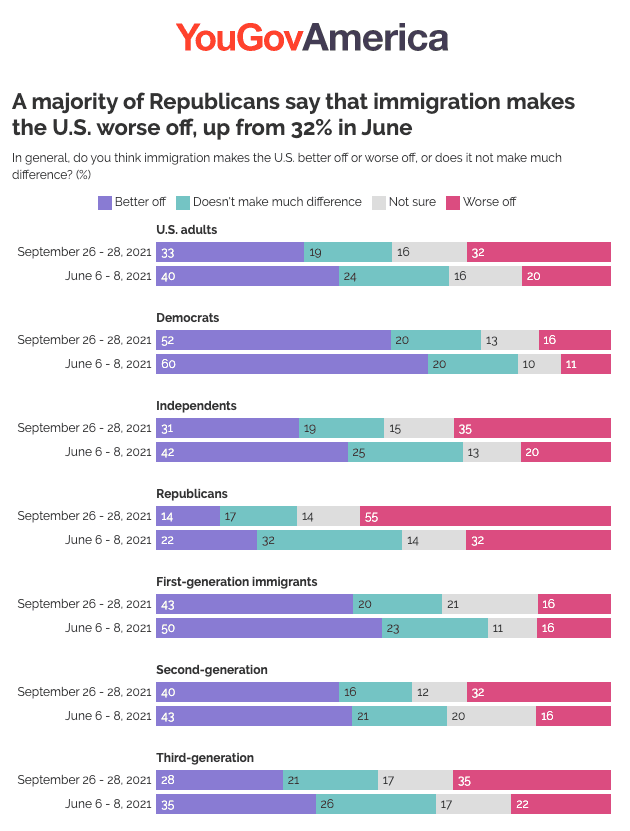Joe Biden’s Economic Strategy Explodes Public Opposition to Migration
President Joe Biden’s open-doors immigration policy has caused a huge 22-point shift in public opinion on preferred immigration levels, a Gallup poll released Monday reveals.
Only nine percent of Americans want more immigration, while 35 percent want less immigration, says the Gallup poll of 811 adults.
That is a dramatic 22-point shift since the end of President Donald Trump’s term on January 20, 2021, when 19 percent wanted less migration and 15 percent wanted more migration.
After just one year of Biden’s border welcome, 69 percent of Republicans wanted immigration reduced, almost double the 40 percent who wanted a reduction in early January 2021.
The share of independents who wanted less immigration has jumped from 19 percent in 2021 up to 32 percent in 2022.
Before Biden’s inauguration, only 2 percent of Democrats wanted more migrants. One year later, 11 percent of Democrats say they want lower migration.
And Biden’s deputies are still digging him deeper into the hole.
In 2021, for example, Alejandro Mayorkas, Biden’s pro-migration border security chief, helped roughly 1.5 million economic migrants cross the southern border. Mayorkas also relaxed rules to help companies import more foreign graduates for jobs needed by U.S. graduates, and announced plans to expand asylum-based migration into Americans’ jobs and communities.
The extraction-migration economic strategy was outlined on January 21 by Treasury Secretary Janet Yellon in a speech to ‘Virtual Davos Agenda’ which was organized by the globalist World Economic Forum.
The administration’s economic policy is a “modern supply side approach” that boosts economic growth with more imported workers, productivity gains, and tax reforms, she said:
My thanks to Klaus [Schwab] and to the World Economic Forum for hosting me.
[…]
Labor supply has been a concern in the United States even before the pandemic, in part due to an aging population and in part due to a labor force participation rate that has trended downward over the past 20 years. Now COVID and declining immigration have further reduced the workforce …
A second focus of the Biden agenda is to enhance productivity. Over the last decade, U.S. labor productivity growth averaged a mere 1.1 percent—roughly half that during the previous fifty years. This has contributed to slow growth in wages and compensation, with especially slow historical gains for workers at the bottom of the wage distribution.
But these goals are contradictory. The immigration of more labor actually reduces per-person wages and minimizes investors’ incentives to raise productivity, even as it also expands the overall size of the economy.
Biden’s pro-migration deputies are already reinflating the cheap-labor bubble that existed from the 1990s until it was popped by the combination of Trump’s lower-immigration policies and China’s coronavirus crash. The labor bubble encouraged Wall Street investors to create many low-wage jobs, to reduce investment in high-wage jobs and productivity-boosting machinery, and to bet on a consumer economy that is inflated by deficit spending and extraction migration.
The contradictory policies are likely caused by differences within Biden’s political coalition and help drive public disappointment in his approach.
President Joe Biden’s poll rating on immigration has slipped down to 35 percent, according to a survey by the Associated Press. https://t.co/3HrQZxenu8
— Breitbart News (@BreitbartNews) October 1, 2021
Biden and many of his east coasts allies — such as unions — seem to want a high-wage, high-tech economy.
But many of his deputies — including his chief of staff, Ron Klain — are entwined with the coastal investors who want to expand the nation’s consumer economy with more cheap workers, high-occupancy renters, and government-aided consumers.
The investors’ extraction-migration strategy is hidden within the Build Back Better legislation, which has stalled because of deep and growing public and GOP opposition. It is also buried in the House Democrats’ anti-China legislation. and is strongly supported by the party’s investor-funded woke progressives who want to gain political power by breaking America’s populist culture into a chaotic multicultural empire.
Politicians recognize that Americans want migration policy to help Americans, not investors, foreigners, and progressives.
“Members of Congress must prioritize our own citizens,” David McCormick, a contender in the GOP Senate primary in Pennsylvania, told Breitbart News. He continued:
I support President Trump’s pro-worker immigration reforms to include preventing corporate visa abuse, raising national security standards, establishing responsible asylum and refugee controls, implementing the Hire American program, and promoting a merit-based system. It is neither in the interest of today’s citizens, nor tomorrow’s immigrants, to admit numbers that erode living conditions, strain healthcare, and make it difficult for low-income workers to rise out of poverty. Washington needs to ensure an immigration system committed to the well-being of our people, from all places and backgrounds, who are already lawfully living here today.
If Congress seeks to import workers, “we need to do it smartly, in order to once again ensure that those new workers aren’t competing with our existing workers for jobs, competing for wages and salaries,” Sen. Todd Young (R-IN) told Punchbowl’s Anna Palmer in a January 25 interview. “This is how we’ll build majority support for immigration reform,” said Young, who is up for election this year.
However, many GOP legislators try to evade debate on the pocketbook damage of illegal migration and legal migration by loudly denouncing border chaos, illegal-migrant crime, and the drug-smuggling cartels. So far, the denunciations have not been combined into a useful or realistic pro-American platform for GOP legislation in 2023.
But the Gallup poll 22-point shift since January 2021 is another reminder that the public — including Latino voters — strongly opposes migration, especially labor migration.
🚨🚨 New poll paints a very different picture of Hispanic voters than what’s often peddled in the media:
☑️ 69% support Trump’s tax cuts
☑️ 55% support more spending on border security
☑️ 51% support limiting refugees and asylum
☑️ 49% support reducing illegal immigration pic.twitter.com/jKfdbFtMmg— Giancarlo Sopo (@GiancarloSopo) December 15, 2021
The Gallup poll’s summary also understates public opposition by downplaying the fervor of the respondents. For example, the details of the poll showed that only 7 percent of all respondents report being “very satisfied” with Biden’s policies, while 41 percent say they are “very dissatisfied.”
The Gallup poll also shows that 34 percent of respondents were “very” or “somewhat” satisfied with immigration levels — even though very Americans actually know the real numbers. The Gallup statement did not say if the pollsters asked Americans what immigration numbers they prefer.
Other polls show that Democrats are far less likely to vote on immigration questions in the 2022 midterms. For example, just 33 percent of Democrats — down from near 50 percent in 2019 — say migration is a critical issue, according to the results released February 3 report by the Public Religion Research Institute. In contrast, 64 percent of Republicans — or two out of three — say immigration is a critical issue.
A YouGov poll also shows the shift in public opinion against migration.
Migration moves money, and since at least 1990, the federal government has tried to extract people from poor countries so they can serve U.S. investors as cheap workers, government-aided consumers, and high-density renters in the U.S. economy.
That economic strategy has no stopping point, and it is harmful to ordinary Americans because it cuts their career opportunities and their wages while it also raises their housing costs.
Extraction migration also curbs Americans’ productivity, shrinks their political clout, and widens the regional wealth gaps between the Democrats’ coastal states and the Republicans’ Heartland states.
An economy built on extraction migration also radicalizes Americans’ democratic, compromise-promoting civic culture and allows wealthy elites to ignore despairing Americans at the bottom of society.
Unsurprisingly, a wide variety of little-publicized polls do show deep and broad opposition to labor migration and the inflow of temporary contract workers into jobs sought by young U.S. graduates.
The opposition is growing, anti-establishment, multiracial, cross-sex, non-racist, class-based, bipartisan, rational, persistent, and recognizes the solidarity that Americans owe to each other.







Comments are closed.